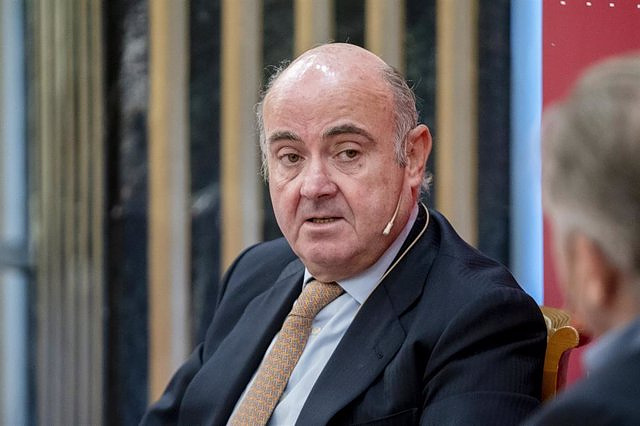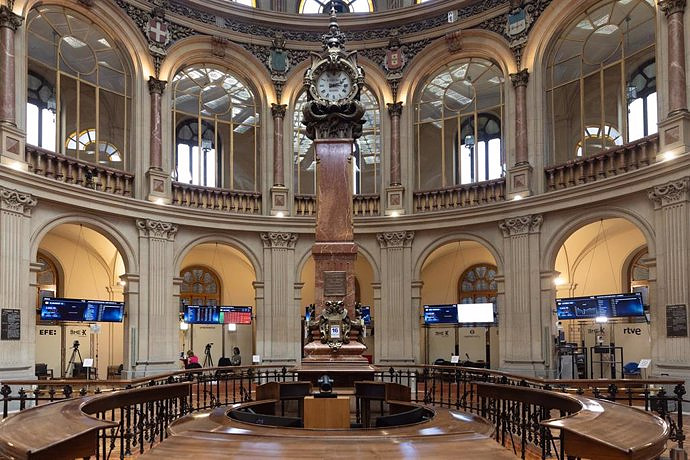MADRID, 26 Sep. (EUROPA PRESS) -
The Vice President of the European Central Bank (ECB), Luis de Guindos, has stressed this Monday that the best way to recover economic growth is to moderate inflation, for which he has justified the rise in interest rates by the institution.
This was highlighted in his speech this Monday in the DiálogosAED cycle, where he explained that as the rise in prices persists, the signals from the markets become more blurred and less clear, so the allocation of assets is much more complicated.
The Governing Council of the European Central Bank (ECB) updated its quarterly macroeconomic projections at the beginning of the month, in which it reflects, without expressly mentioning it, that the Eurozone will fall into what is known as 'stagflation', that is, stagnation of the economy but with high price increases.
The forecasts have worsened to a greater extent for 2023: while in June the agency expected growth of 2.1%, the effect of energy prices on the purchasing power of citizens and the impact of supply problems on the economic activity has led them to reduce it to 0.9% for the whole of the Nineteen.
Faced with this situation, the Vice President of the ECB has stressed the need to focus the measures on those who have low incomes, who are the ones who are feeling the most the effect of inflation by dedicating practically 100% of the total to consumption.
Regarding Italy, which held its elections this Sunday, De Guindos has pointed out that the country's economy has done better than the European average in the last two years and that it has already recovered the level of income prior to the pandemic.
In addition, its banking sector is doing better than a few years ago, with a level of doubtful credit that stands at around 3%. The problem, for De Guindos, is that his public debt is around 150% of GDP, but he has highlighted that he has a "very good" net investment position.
On the other hand, De Guindos has avoided commenting on the tax presented by the Spanish Government to banks and has recalled that although the Congress of Deputies may request an opinion from the body, this would not be binding.
Thus, he has repeated that this rate should not hinder the granting of credit or tighten financing conditions, nor harm the solvency of the sector.
As for the Spanish economy, the ECB Vice President highlighted that it has two advantages: the banking sector is not in doubt, unlike in 2010, and the strength of its foreign sector. "I would ask that these two pillars, which are fundamental, be maintained," he pointed out.
When asked about the European funds, De Guindos explained that it is very important to spend time choosing the best projects, as this time it is transfers and not loans, although he does not know why the aid is being granted so slowly in Spain.

 Exploring Cardano: Inner Workings and Advantages of this Cryptocurrency
Exploring Cardano: Inner Workings and Advantages of this Cryptocurrency Seville.- Economy.- Innova.- STSA inaugurates its new painting and sealing hangar in San Pablo, for 18 million
Seville.- Economy.- Innova.- STSA inaugurates its new painting and sealing hangar in San Pablo, for 18 million Innova.- More than 300 volunteers join the Andalucía Compromiso Digital network in one month to facilitate access to ICT
Innova.- More than 300 volunteers join the Andalucía Compromiso Digital network in one month to facilitate access to ICT Innova.-AMP.- Ayesa acquires 51% of Sadiel, which will create new technological engineering products and expand markets
Innova.-AMP.- Ayesa acquires 51% of Sadiel, which will create new technological engineering products and expand markets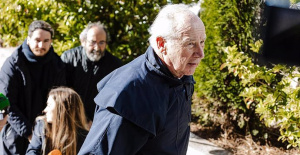 The Prosecutor's Office requests 63 years in prison for Rato and a fine of more than 42 million euros
The Prosecutor's Office requests 63 years in prison for Rato and a fine of more than 42 million euros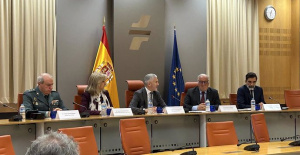 Marlaska puts more radars, surveillance on highways and motorists, and controls in the face of the increase in accidents
Marlaska puts more radars, surveillance on highways and motorists, and controls in the face of the increase in accidents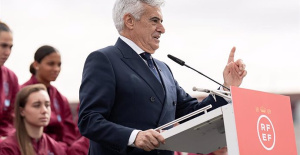 Pedro Rocha, elected new president of the RFEF
Pedro Rocha, elected new president of the RFEF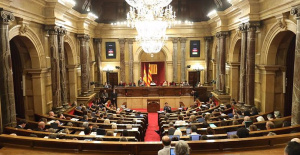 The PSC would win the elections with 40-47 seats and ERC is ahead of Junts, according to the CEO
The PSC would win the elections with 40-47 seats and ERC is ahead of Junts, according to the CEO How Blockchain in being used to shape the future
How Blockchain in being used to shape the future Not just BTC and ETH: Here Are Some More Interesting Coins Worth Focusing on
Not just BTC and ETH: Here Are Some More Interesting Coins Worth Focusing on The UA opens the call for the Impulso 2024 Awards for the best innovative business initiatives
The UA opens the call for the Impulso 2024 Awards for the best innovative business initiatives ALI, virtual assistant from Alicante, internationally recognized by the OECD
ALI, virtual assistant from Alicante, internationally recognized by the OECD Retrópolis brings the golden age of video games and computing to the UPV
Retrópolis brings the golden age of video games and computing to the UPV Looking for video games that value the neighborhoods of Valencia
Looking for video games that value the neighborhoods of Valencia A million people demonstrate in France against Macron's pension reform
A million people demonstrate in France against Macron's pension reform Russia launches several missiles against "critical infrastructure" in the city of Zaporizhia
Russia launches several missiles against "critical infrastructure" in the city of Zaporizhia A "procession" remembers the dead of the Calabria shipwreck as bodies continue to wash up on the shore
A "procession" remembers the dead of the Calabria shipwreck as bodies continue to wash up on the shore Prison sentences handed down for three prominent Hong Kong pro-democracy activists
Prison sentences handed down for three prominent Hong Kong pro-democracy activists ETH continues to leave trading platforms, Ethereum balance on exchanges lowest in 3 years
ETH continues to leave trading platforms, Ethereum balance on exchanges lowest in 3 years Investors invest $450 million in Consensys, Ethereum incubator now valued at $7 billion
Investors invest $450 million in Consensys, Ethereum incubator now valued at $7 billion Alchemy Integrates Ethereum L2 Product Starknet to Enhance Web3 Scalability at a Price 100x Lower Than L1 Fees
Alchemy Integrates Ethereum L2 Product Starknet to Enhance Web3 Scalability at a Price 100x Lower Than L1 Fees Mining Report: Bitcoin's Electricity Consumption Declines by 25% in Q1 2022
Mining Report: Bitcoin's Electricity Consumption Declines by 25% in Q1 2022 Oil-to-Bitcoin Mining Firm Crusoe Energy Systems Raised $505 Million
Oil-to-Bitcoin Mining Firm Crusoe Energy Systems Raised $505 Million Microbt reveals the latest Bitcoin mining rigs -- Machines produce up to 126 TH/s with custom 5nm chip design
Microbt reveals the latest Bitcoin mining rigs -- Machines produce up to 126 TH/s with custom 5nm chip design Bitcoin's Mining Difficulty Hits a Lifetime High, With More Than 90% of BTC Supply Issued
Bitcoin's Mining Difficulty Hits a Lifetime High, With More Than 90% of BTC Supply Issued The Biggest Movers are Near, EOS, and RUNE during Friday's Selloff
The Biggest Movers are Near, EOS, and RUNE during Friday's Selloff Global Markets Spooked by a Hawkish Fed and Covid, Stocks and Crypto Gain After Musk Buys Twitter
Global Markets Spooked by a Hawkish Fed and Covid, Stocks and Crypto Gain After Musk Buys Twitter Bitso to offset carbon emissions from the Trading Platform's ERC20, ETH, and BTC Transactions
Bitso to offset carbon emissions from the Trading Platform's ERC20, ETH, and BTC Transactions Draftkings Announces 2022 College Hoops NFT Selection for March Madness
Draftkings Announces 2022 College Hoops NFT Selection for March Madness